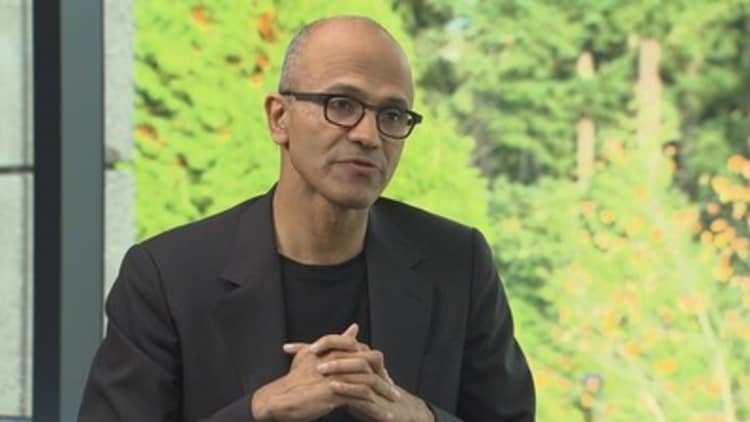Amazon Web Services still has the clear lead in the cloud infrastructure market. But according to Thursday's earnings reports, Microsoft's rival offering is growing more than twice as fast.
One reason is that longtime users of Microsoft's ubiquitous desktop software and Windows servers are sticking with the company they've known for decades, now that its Azure cloud technology is ready for prime time.
Companies like Sapient Consulting (a part of advertising giant Publicis), software developer Bentley Systems and biopharmaceutical services company Parexel have all chosen Azure over AWS.
"With Microsoft, their pedigree is as an enterprise software company," said Arun Karur, a vice president at Publicis' Sapient Consulting organization, in an interview with CNBC. About two years ago, executives chose to centralize public cloud use on Azure, and Sapient Consulting has plans to move over all of the "legacy solutions that were on AWS," Karur said.
(Publicis Groupe later clarified that the full company has not officially chosen a single cloud provider.)
To date, Amazon hasn't been hampered by its short history in the enterprise. The company pioneered cloud infrastructure in 2006, letting developers quickly sign up to build websites, apps and run workloads by renting compute and storage capacity rather than buying their own hardware.
Over the past decade, AWS has built a global sales force and bolstered its service agreements to meet the demands of large companies.
AWS is still putting up big numbers, growing 42 percent in the third quarter to $4.58 billion. Amazon CFO Brian Olsavsky said on Thursday's earnings call that "usage growth is actually growing a lot higher than revenue growth" and that the company is "particularly pleased with the new customers that we've added."
Azure's revenue increased 90 percent in the period and has exceeded AWS growth for at least eight straight quarters, but Microsoft has yet to break out the unit's sales. According to Synergy Research Group, AWS controls 34 percent of the market while Azure has 12 percent.
However, Microsoft is picking up high-profile clients as it adds features, lowers prices and expands data center capacity around the world.
'Once-in-a-lifetime opportunity'
As a producer of desktop software for engineers and architects, Bentley Systems has viewed Microsoft as a partner for decades, Rob Whitesell, its chief platform officer, told CNBC. The company has been using Azure and AWS products for several years but opted to make Azure its primary cloud provider when Microsoft's commitment to the cloud became clear.
We saw it as "a once-in-a-lifetime opportunity to make a bet on a significant paradigm shift in computing," Whitesell said.
According to Whitesell, Bentley's developers were already familiar with Microsoft software, and they preferred Azure to AWS because of the simplicity involved in building and running applications on multiple machines.
"I don't know what would convince us to move at this point," Whitesell said, adding that Microsoft's artificial intelligence technology is also compelling.
Like most big companies with pre-cloud infrastructure, Publicis has its own data centers and is only moving certain workloads to the cloud. And Microsoft can support both, Karur said.
Additionally, Publicis' Sapient Consulting team works with regulated financial services and energy companies. If the main cloud infrastructure provider were Amazon or Google, Karur said, a bank might be concerned about how its customer data would be used.
"I will not have a good counter for that," he said.
FleetBoard, a Daimler AG subsidiary that makes telematics tools for commercial vehicles, committed to running all its services on Azure earlier this year. Before choosing Microsoft, FleetBoard looked at AWS and other providers, said Jens Kamlowski, the lead architect of Nxtload, the first FleetBoard product to run on Azure.
"We decided pretty quickly and decisively" to go with Microsoft, Kamlowski said. He said it came down to "the history we have with them and what they can offer us in regard to data security and scalability and how we think we can work together."
And earlier this week, Microsoft announced that Parexel International will move its Informatics technology division to Azure. Parexel evaluated AWS but chose Microsoft's cloud instead, said Xavier Flinois, president of Parexel Informatics. Parexel has historically used Microsoft technology for its own data center infrastructure.
"The way the Azure cloud works, you can also work with a hybrid setup," Flinois said. That "will greatly facilitate our transition to a pure Azure stack going forward."
There's also some concern about Amazon's track record of competing with customers and partners, whether by launching a storage system that's similar to a customer's offering, or by investing in a video-conferencing company before cloning its product.
"Are we afraid Microsoft turns the guns against us?" Flinois said. "That's not there."
Update: This story was updated to reflect that Sapient Consulting is a division of Publicis Groupe, and Publicis has not standardized on a single cloud provider, but is officially "cloud-agnostic."


